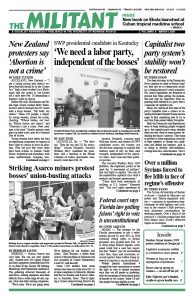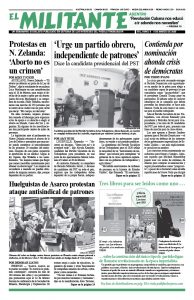MIAMI — The attempt by the Florida government to gut a referendum passed by over 60% in 2018 restoring voting rights to former prisoners was pushed back Feb. 19. A three-judge federal appeals court panel ruled that a new law requiring that “felons” pay all outstanding court fees, fines and restitution assessed against them before being allowed to register is unconstitutional.
Widely popular Amendment 4 changed the state constitution to restore the right to vote to former prisoners once they are off parole or probation, with the exception of those found guilty of murder or sex crimes. Some 1.6 million people became eligible to vote.
Before this victory for voting rights, a 19th-century Jim Crow plank in the constitution left any restoration of an ex-inmate’s right to vote up to the whim of the governor.
State legislators responded to the referendum victory by rapidly moving to pass a law “clarifying” the amendment. To get the right to vote, the law said, former prisoners had to first complete “all terms of [their] sentence.” For most that means having to come up with thousands of dollars.
A University of Florida study estimates that 80% of former prisoners — who face rampant job discrimination — will never earn enough to pay the fees.
Many defenders of the right to vote explain that this amounts to a modern-day poll tax, like those used across the South for decades to keep Blacks from voting. Before the passage of Amendment 4, over 20% of Blacks in Florida were ineligible to vote because of a criminal conviction.
The appeals court panel ruled that the restrictions violate the 14th Amendment to the U.S. Constitution, which guarantees equal protection under the law to everyone. The law is “preventing the plaintiffs from voting based solely on their genuine inability to pay legal financial obligations,” the three judges wrote in their unanimous decision. “[T]hese plaintiffs are punished more harshly than those who committed precisely the same crime” but who had enough money to pay the judgments against them “by having their right to vote taken from them likely for their entire lives. ”
For the time being the ruling applies only to the 17 former felons who filed the suit, stating they could not pay the fees.
Gov. Ron DeSantis said his office will appeal the ruling, asking for the full 11th Circuit Court of Appeals to overturn it.
“We are cautiously optimistic,” Desmond Meade, a central leader of the campaign that won the passage of Amendment 4, told the press, adding, “We know that this legal battle is far from over.”
Cynthia Landy, a stocker at a Miami Walmart, said the attempts to deny ex-prisoners the right to vote, “are wrong when so many of us voted to give them that right.” An African American, Landy has worked at Walmart for 10 years. “Many of us have fought so hard to get the right to vote for everybody,” she said.
The Socialist Workers Party joined in the campaign for Amendment 4. SWP candidate for U.S. Congress Anthony Dutrow hailed the court ruling and commended the former prisoners who have taken the lead in fighting to extend the franchise. “We stand with you in this fight, which is in the interests of all working people,” he said.
In April the question of whether the case covers all former prisoners will go to trial.

